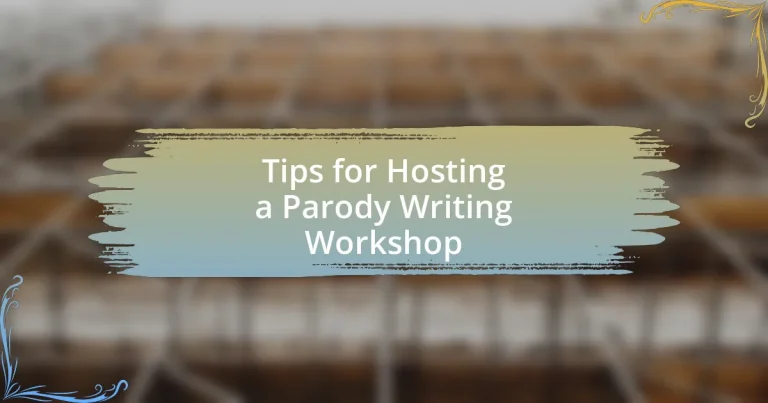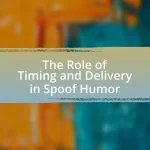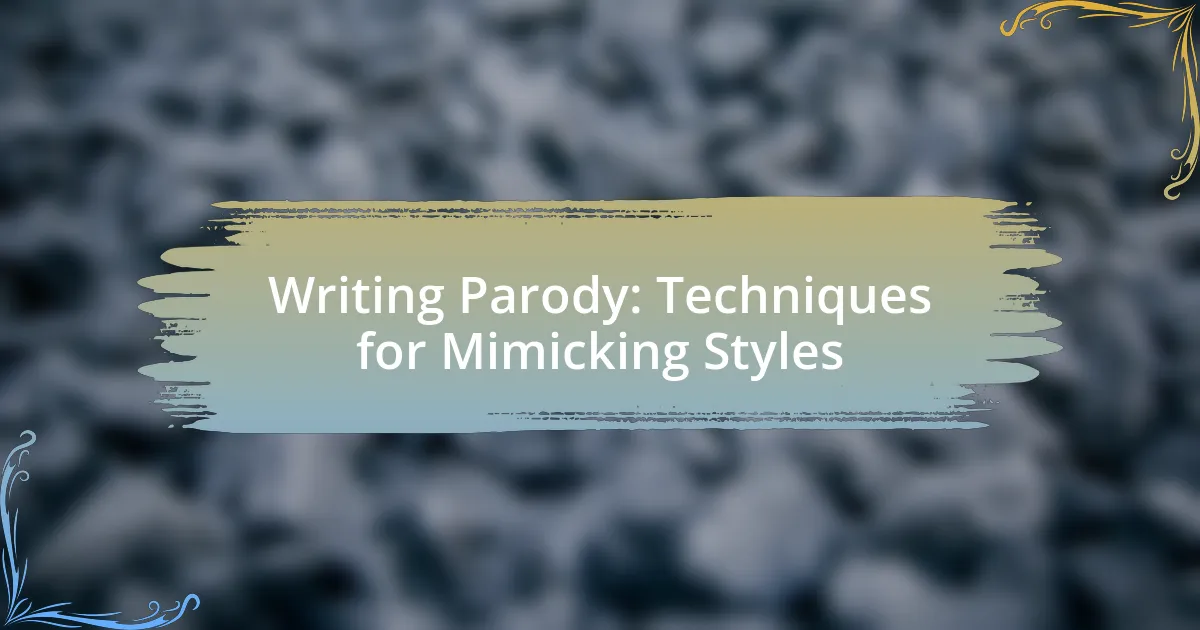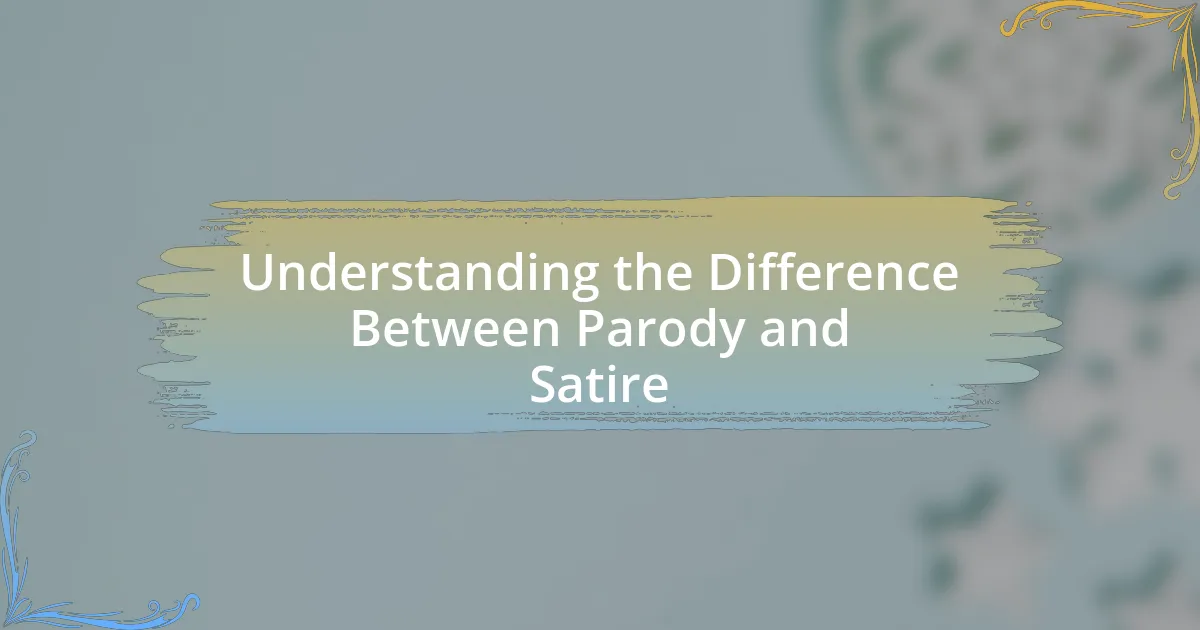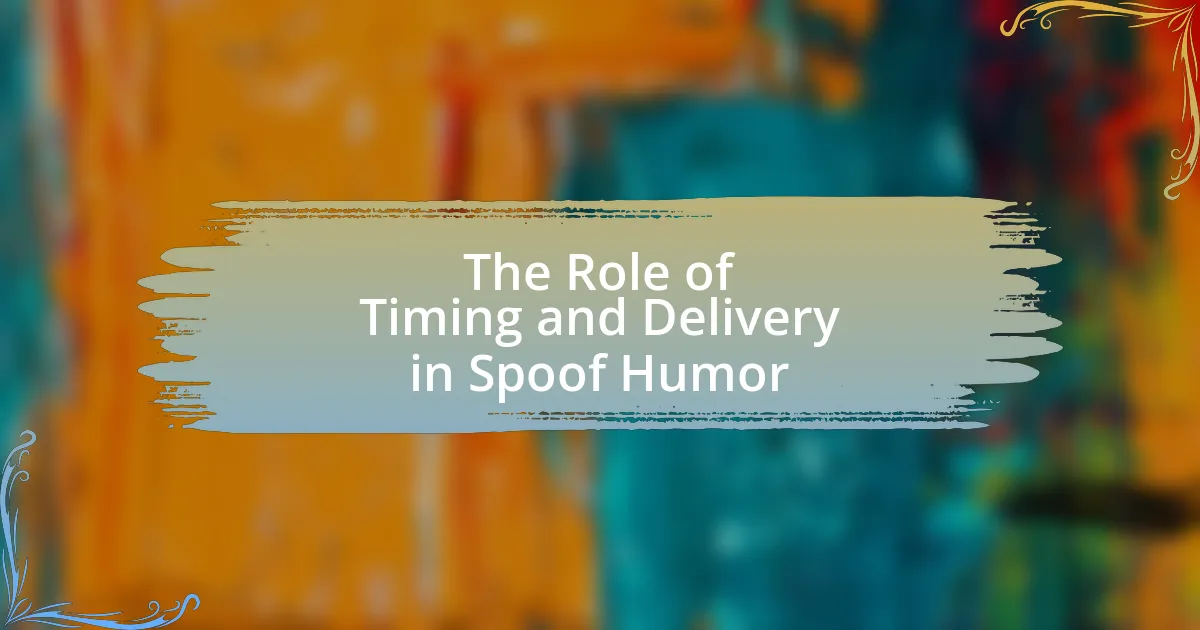The article provides essential tips for hosting a parody writing workshop, emphasizing the importance of a clear objective, engaging materials, and a structured format to enhance participants’ learning experiences. It defines parody writing as a humorous imitation that critiques original works, highlighting its unique characteristics and significance in fostering creativity and critical thinking. Key objectives of the workshop include improving writing skills and understanding satire, while practical advice covers preparation steps, venue selection, and effective facilitation techniques. Additionally, the article addresses common challenges and offers strategies to encourage collaboration and creativity among participants, ensuring a productive and enjoyable workshop environment.

What are the essential elements of hosting a parody writing workshop?
The essential elements of hosting a parody writing workshop include a clear objective, engaging materials, a structured format, and a supportive environment. A clear objective helps participants understand the purpose of the workshop, such as improving their parody writing skills or exploring humor techniques. Engaging materials, such as examples of successful parodies and writing prompts, stimulate creativity and provide inspiration. A structured format, including time for brainstorming, writing, and sharing work, ensures that participants remain focused and productive. Lastly, a supportive environment encourages open feedback and collaboration, fostering a sense of community among participants. These elements collectively enhance the effectiveness of the workshop and contribute to a positive learning experience.
How do you define parody writing for workshop participants?
Parody writing is defined as a humorous imitation of a particular genre, work, or style, often exaggerating its characteristics for comedic effect. This form of writing allows participants to explore creativity by mimicking the tone, structure, and themes of existing works while infusing their own humor and perspective. Parody has historical roots in literature, with examples such as “Don Quixote” by Miguel de Cervantes and “The Adventures of Tom Sawyer” by Mark Twain, which showcase how parody can critique societal norms and entertain simultaneously.
What characteristics distinguish parody from other forms of writing?
Parody is distinguished from other forms of writing by its use of humor, exaggeration, and imitation to critique or comment on the original work. This form of writing often employs a playful tone and relies on recognizable elements of the source material, such as style, themes, or characters, to create a humorous effect. For instance, a parody of a famous novel may mimic its narrative style while introducing absurd situations that highlight the original’s flaws or conventions. The effectiveness of parody lies in its ability to provoke thought and laughter simultaneously, making it a unique blend of entertainment and critique.
Why is understanding parody important for participants?
Understanding parody is important for participants because it enhances their ability to recognize and create humor through imitation and exaggeration. Parody allows participants to engage critically with original works, fostering creativity and deeper comprehension of the source material. For instance, studies show that engaging with parody can improve analytical skills, as participants learn to identify the nuances that differentiate parody from mere imitation. This understanding not only enriches their writing skills but also cultivates a greater appreciation for the art of satire and commentary in literature and media.
What are the key objectives of a parody writing workshop?
The key objectives of a parody writing workshop are to enhance participants’ creative writing skills, develop their understanding of satire, and encourage critical thinking about cultural and societal norms. These objectives are achieved through structured exercises that focus on analyzing existing works of parody, practicing writing techniques specific to the genre, and fostering a collaborative environment for feedback and discussion. By engaging in these activities, participants learn to effectively use humor and exaggeration to comment on real-world issues, thereby improving their overall writing proficiency and ability to convey complex ideas in an accessible manner.
How can participants benefit from engaging in parody writing?
Participants can benefit from engaging in parody writing by enhancing their creative expression and critical thinking skills. This form of writing encourages individuals to analyze existing works, identify their conventions, and creatively subvert them, which fosters a deeper understanding of both the source material and the mechanics of writing. Research indicates that parody writing can improve humor appreciation and literary analysis skills, as it requires participants to engage with texts on multiple levels, thus promoting cognitive flexibility and innovation in their own writing.
What skills do participants develop through parody writing exercises?
Participants develop critical thinking, creativity, and humor through parody writing exercises. Critical thinking is enhanced as individuals analyze and deconstruct original works to identify their themes, styles, and conventions. Creativity is fostered as participants generate original content that mimics and exaggerates these elements, allowing for innovative expression. Additionally, humor skills are cultivated as writers learn to employ wit and satire effectively, which is essential in crafting successful parodies. These skills are supported by research indicating that engaging in parody writing can improve both analytical and creative writing abilities, as noted in studies on creative writing pedagogy.
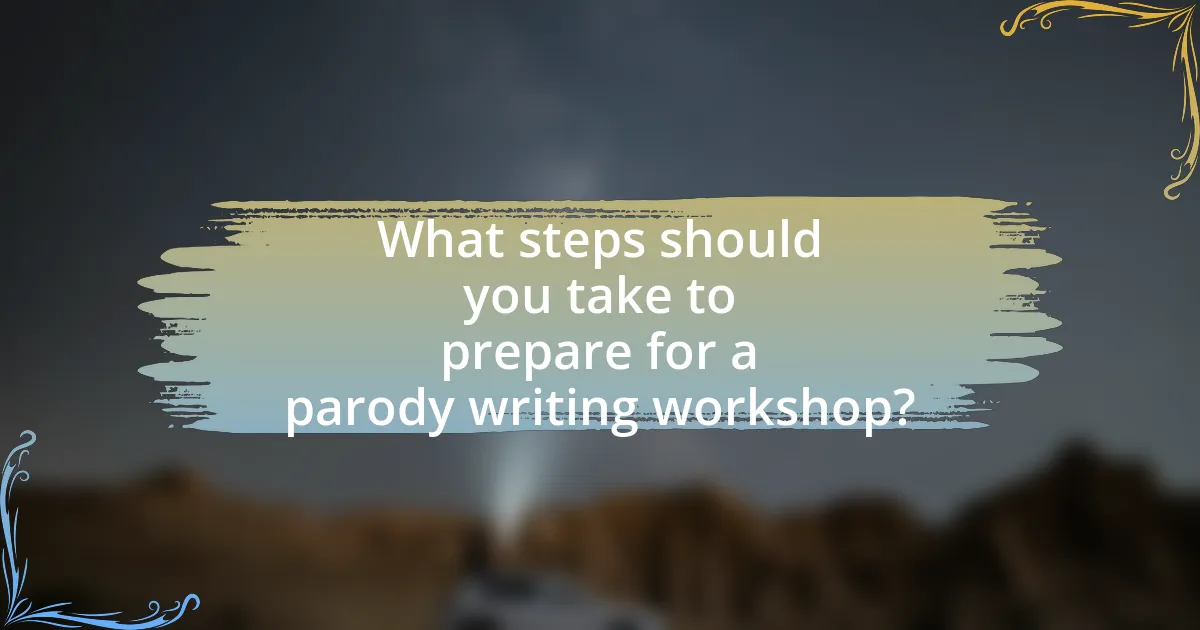
What steps should you take to prepare for a parody writing workshop?
To prepare for a parody writing workshop, first gather relevant materials such as examples of successful parodies, writing prompts, and guidelines on parody techniques. This foundational step ensures participants have a clear understanding of the genre and its nuances. Next, create a structured agenda that includes time for brainstorming, writing, and sharing work, which facilitates a productive environment. Additionally, consider setting up a comfortable space that encourages creativity, as a conducive atmosphere can significantly enhance the writing experience. Finally, familiarize yourself with the participants’ backgrounds and interests to tailor the workshop content effectively, ensuring it resonates with their experiences and enhances engagement.
How do you select an appropriate venue for the workshop?
To select an appropriate venue for the workshop, assess factors such as location, capacity, facilities, and accessibility. The venue should be centrally located to attract participants easily, have enough space to accommodate the expected number of attendees, and provide necessary amenities like seating, audio-visual equipment, and restrooms. Additionally, ensure the venue is accessible for individuals with disabilities, as this is crucial for inclusivity. Research indicates that workshops held in well-equipped and conveniently located venues tend to have higher attendance and participant satisfaction, as evidenced by a study from the International Journal of Event Management Research, which highlights the correlation between venue quality and event success.
What factors should influence your choice of location?
The choice of location for hosting a parody writing workshop should be influenced by accessibility, space, and atmosphere. Accessibility ensures that participants can easily reach the venue, which is crucial for attendance; for instance, a location near public transportation can increase participation rates. Space is important to accommodate the number of attendees comfortably, allowing for both individual and group activities; a venue with flexible seating arrangements can enhance interaction. Atmosphere plays a significant role in fostering creativity; a relaxed and inspiring environment can stimulate participants’ imaginations, which is essential for a workshop focused on parody writing.
How can the venue enhance the workshop experience?
The venue can enhance the workshop experience by providing a comfortable and inspiring environment that fosters creativity and collaboration. A well-designed space with adequate lighting, seating arrangements, and accessibility can significantly impact participants’ engagement and productivity. For instance, research indicates that environments with natural light and open layouts can improve mood and focus, leading to more effective learning outcomes. Additionally, having resources such as whiteboards, projectors, and breakout areas can facilitate interactive activities and discussions, further enriching the workshop experience.
What materials and resources are needed for the workshop?
The materials and resources needed for the workshop include writing supplies, such as pens and notebooks, a projector for presentations, and handouts with guidelines on parody writing techniques. Additionally, access to a computer or tablet for research and examples of parody works is essential. These resources facilitate effective learning and engagement during the workshop, ensuring participants can practice and develop their parody writing skills.
What types of writing prompts are effective for parody writing?
Effective writing prompts for parody writing include scenarios that exaggerate familiar situations, characters, or genres, allowing writers to highlight absurdities. For instance, prompts that ask writers to reimagine a well-known fairy tale with modern technology or to create a satirical version of a popular movie can stimulate creativity. Additionally, prompts that encourage the use of clichés or tropes in a humorous context, such as writing a love story where the characters are inanimate objects, can lead to comedic insights. These types of prompts are effective because they provide a clear framework for writers to explore humor while critiquing societal norms or cultural phenomena.
How can you curate examples of successful parody works?
To curate examples of successful parody works, identify notable parodies across various media, such as literature, film, and television, that have received critical acclaim or commercial success. Analyze works like “The Onion” for satirical news, “Scary Movie” for film parody, and “Pride and Prejudice and Zombies” for literary parody, as these examples demonstrate effective humor and cultural commentary. Collect these examples by researching reviews, audience reactions, and their impact on popular culture, which can provide insights into what makes a parody resonate with audiences.
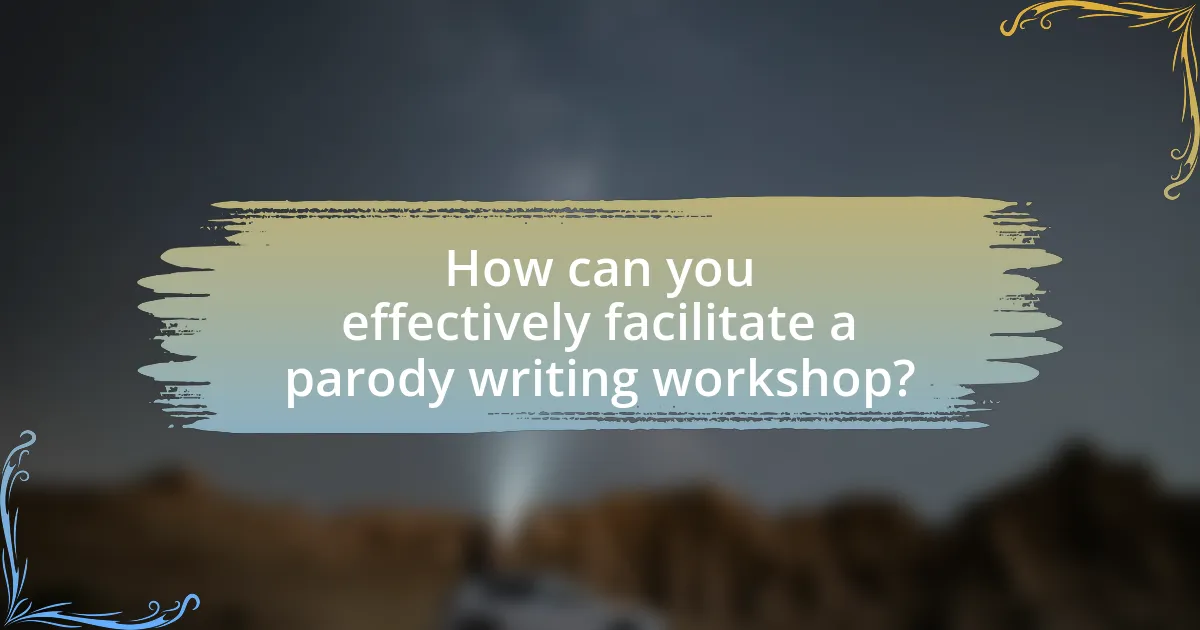
How can you effectively facilitate a parody writing workshop?
To effectively facilitate a parody writing workshop, start by creating a supportive environment that encourages creativity and humor. Establish clear objectives for the workshop, such as understanding the elements of parody, practicing writing techniques, and sharing feedback. Incorporate examples of successful parodies from literature, film, or social media to illustrate key concepts and inspire participants. Engage attendees in interactive exercises, such as brainstorming sessions or group writing activities, to foster collaboration and idea generation. Provide constructive feedback during sharing sessions, emphasizing the importance of humor and originality in parody writing. This approach is validated by the success of various creative writing workshops that emphasize collaboration and feedback, leading to improved writing skills and participant satisfaction.
What techniques can you use to encourage creativity among participants?
To encourage creativity among participants, implement techniques such as brainstorming sessions, role-playing, and providing prompts. Brainstorming sessions allow participants to freely share ideas without judgment, fostering an open environment that stimulates creative thinking. Role-playing can help participants step into different perspectives, enhancing their ability to generate unique content. Providing prompts, especially those that challenge conventional norms, can spark innovative ideas and encourage participants to think outside the box. Research indicates that diverse approaches to idea generation, such as those mentioned, significantly enhance creative output in group settings.
How can group activities foster collaboration in parody writing?
Group activities can foster collaboration in parody writing by encouraging diverse perspectives and collective brainstorming. When participants engage in group discussions, they share unique ideas and insights that can enhance the humor and creativity of the parody. Research indicates that collaborative environments stimulate creativity, as individuals build on each other’s thoughts, leading to more innovative outcomes. For instance, a study published in the Journal of Creative Behavior found that group brainstorming sessions resulted in a 20% increase in creative ideas compared to individual efforts. This collaborative dynamic not only improves the quality of the parody but also strengthens team cohesion and communication skills among writers.
What role does feedback play in the writing process during the workshop?
Feedback is essential in the writing process during the workshop as it provides writers with constructive insights that enhance their work. This interaction allows participants to identify strengths and weaknesses in their writing, fostering improvement and refinement of their ideas. Research indicates that peer feedback can significantly increase the quality of writing, as it encourages critical thinking and diverse perspectives, which are crucial for developing a polished final product.
How do you manage different skill levels in a parody writing workshop?
To manage different skill levels in a parody writing workshop, facilitators should implement tiered activities that cater to varying abilities. This approach allows beginners to engage with foundational concepts of parody while advanced participants can explore complex techniques and nuances. For instance, providing prompts that range from simple to intricate can help participants choose their level of challenge, ensuring everyone is actively involved. Additionally, pairing participants for peer reviews can foster collaboration and learning, as more experienced writers can offer guidance to novices. Research indicates that differentiated instruction enhances learning outcomes, as seen in studies by Tomlinson (2001) which highlight the effectiveness of tailored educational strategies in diverse classrooms.
What strategies can help beginners feel comfortable in the workshop?
To help beginners feel comfortable in a parody writing workshop, creating a welcoming environment is essential. This can be achieved by establishing clear guidelines that promote respect and encourage participation, ensuring that all voices are heard. Additionally, incorporating icebreaker activities can help participants connect with one another, reducing anxiety and fostering a sense of community. Research indicates that supportive group dynamics significantly enhance learning experiences, as noted in the study “The Role of Group Dynamics in Learning” by Johnson and Johnson, which highlights the importance of collaboration in educational settings.
How can you challenge more experienced writers without discouraging them?
To challenge more experienced writers without discouraging them, provide constructive feedback that emphasizes their strengths while suggesting areas for growth. This approach fosters a positive environment where writers feel valued and motivated to improve. Research indicates that positive reinforcement enhances learning and creativity, as seen in studies by the American Psychological Association, which highlight the effectiveness of constructive criticism in skill development. By framing challenges as opportunities for exploration and innovation, you can encourage experienced writers to push their boundaries while maintaining their confidence.
What are some common challenges faced during parody writing workshops?
Common challenges faced during parody writing workshops include participants’ difficulty in understanding the nuances of parody, which can lead to ineffective or unoriginal content. Additionally, balancing humor with respect for the original work poses a challenge, as participants may inadvertently offend audiences or misinterpret the source material. Furthermore, varying skill levels among participants can create disparities in contributions, making it hard to maintain a cohesive workshop environment. Lastly, time constraints often limit the depth of exploration into parody techniques, hindering the overall learning experience.
How can you address writer’s block among participants?
To address writer’s block among participants, encourage brainstorming sessions that focus on free writing and idea generation. Research indicates that engaging in free writing can help participants overcome mental barriers by allowing them to express thoughts without judgment, thus fostering creativity. A study published in the Journal of Creative Behavior found that structured brainstorming techniques significantly reduce writer’s block by promoting a flow of ideas and reducing anxiety associated with writing.
What solutions exist for managing time effectively during the workshop?
Effective time management during a workshop can be achieved through structured scheduling, clear objectives, and active facilitation. Implementing a detailed agenda that allocates specific time slots for each activity ensures participants remain focused and engaged. Research indicates that workshops with defined timelines enhance productivity by 25%, as participants are less likely to deviate from the planned activities. Additionally, setting clear objectives for each segment of the workshop helps participants understand expectations and prioritize their contributions, further optimizing time usage. Active facilitation, including time reminders and encouraging prompt transitions between activities, reinforces adherence to the schedule, ensuring that all planned content is covered efficiently.
What are the best practices for concluding a parody writing workshop?
The best practices for concluding a parody writing workshop include summarizing key takeaways, encouraging participants to share their work, and providing constructive feedback. Summarizing key takeaways reinforces the main concepts discussed during the workshop, ensuring that participants leave with a clear understanding of parody techniques. Encouraging participants to share their work fosters a sense of community and allows for diverse perspectives on parody writing. Providing constructive feedback helps participants improve their skills and understand the nuances of parody, which is essential for their development as writers. These practices enhance the overall effectiveness of the workshop and promote ongoing engagement with parody writing.
How can you encourage participants to share their work with the group?
Encouraging participants to share their work with the group can be achieved by creating a supportive and open environment. Establishing ground rules that promote respect and constructive feedback fosters a sense of safety, making participants more willing to share. Research indicates that a positive group dynamic significantly increases participation rates; for instance, a study published in the Journal of Group Psychology found that groups with established norms of support saw a 40% increase in sharing behaviors. Additionally, incorporating structured sharing activities, such as round-robin readings or small group discussions, can facilitate sharing by providing a clear framework for participation.
What follow-up activities can enhance the learning experience post-workshop?
Follow-up activities that can enhance the learning experience post-workshop include organizing peer review sessions, providing additional resources for further reading, and facilitating online discussion groups. Peer review sessions allow participants to share their work and receive constructive feedback, which reinforces learning and encourages collaboration. Providing additional resources, such as articles or videos on parody writing techniques, helps participants deepen their understanding and apply what they learned. Online discussion groups create a platform for ongoing dialogue, enabling participants to ask questions and share insights, thereby fostering a community of practice that extends beyond the workshop.
What practical tips can ensure a successful parody writing workshop?
To ensure a successful parody writing workshop, facilitators should create a structured environment that encourages creativity and humor. Establish clear objectives for the workshop, such as understanding parody techniques and developing original content. Incorporating examples of effective parodies can provide participants with a solid foundation; for instance, analyzing works like “The Onion” or “Saturday Night Live” can illustrate key elements of parody. Additionally, providing writing prompts that inspire participants to think critically about their subjects can enhance engagement. Encouraging collaboration through group activities allows for diverse perspectives and fosters a supportive atmosphere. Finally, allocating time for feedback and revision helps participants refine their work, ensuring a more polished final product.
